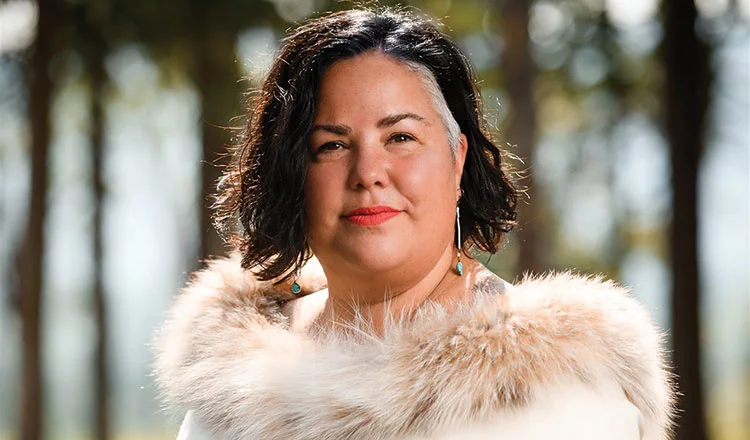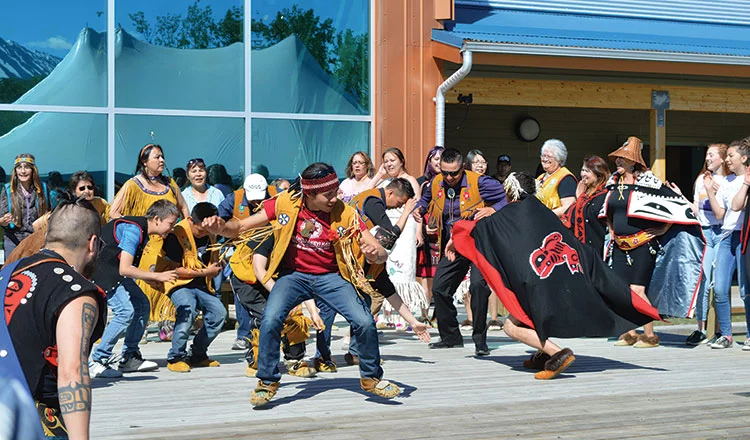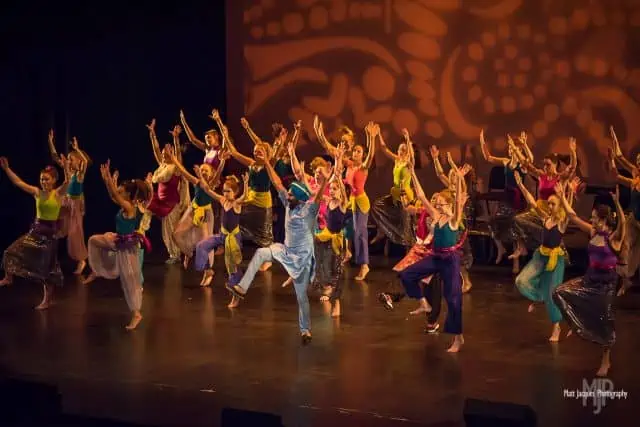Klukshu village, or Klukshu Łu Ghą is an important part of who Sheila Joe is. The heritage resources officer for the Champagne and Aishihik First Nations (CAFN) spent a lot of time with her grandparents while growing up, and looks back on her time there fondly. She gets her sense of belonging from that community.
Back then, she didn’t pay as much attention to the cultural aspect of going fishing at the village, and the rich history of the place:
“What I remember most are the enormous amounts of fish, we’d gaff them and pull them up using willow and my grandmother would clean the fish,” Joe says. “It’s just the memories of me being there with my grandparents…[my grandmother] would do most of the work, cleaning and drying. We were very fortunate to spend a lot of time out there.”
That’s why she’s excited for a new project underway at CAFN: to honour their elders by bringing them together with CAFN youth. Champagne and Aishihik are hosting oral history sessions in each of their traditional communities, starting with Klukshu village August 11 to bring history to light.
“We hadn’t had a session like this before. I wanted to gather our elders who lived there and had a connection with Klukshu in the past,” Joe says.
She hopes to gather as many stories from the CAFN elders as possible.
The goal is to have people ready to sit down with elders to record and transcribe their stories about the different traditional communities, including Champagne.
“I knew it was always a part of our history…[but now], our elders are getting older if we don’t get that history it will be lost,” says Joe.
The event is open to all CAFN citizens and there will be a translator present so that elders can tell their stories in whichever language they choose, likely English or Southern Tutchone.
The session is part of a two-day CAFN culture camp that ties language, culture, and heritage together. The plan is to show historical photographs and maps on a large screen to spark discussion and storytelling.
Some of the photos, from peoples’ personal collections and from the Catherine McClelland collection, date back to the 1890s. In one old photo, a group of children stand in front of a cabin at Klukshu, which was mainly a fishing camp.
“We have the stories of people taking bundles of fish to Champagne,” Joe says.
As CAFN Elders share their memories and information, heritage workers will be there to record and document the event while sharing tea and a meal. While the photos will be up for everyone to see, participants can potentially break out into smaller groups.
“We want to get elders and youth together,” Joe says. “They do remember those stories, sometimes these pictures help draw their memories back,” she adds.
In one instance, Joe used Google Earth, a virtual globe, map and geographical information program, to help elders show Joe place names around Dezadeash Lake, as well as different historical trails and trade-routes.
“We can get the information from our elders and we can share that with our youth,” Joe says.
The session will also help determine where families used to live. Some had cabins in Champagne, Tutshi, or Aishihik. In Champagne, there were potlatch and clan houses that Joe would like to hear about. Those potlatches served as a time of celebration and dancing, she says.
There was also a trading post, a Taylor and Drury store, an RCMP office, and a church in the community. When people from other communities came to visit, they would decorate their sled-dogs with bells and people would hear them coming. At one point, there were even rodeos in Champagne.
But things have changed drastically — and that’s part of the story, says Joe.
“Even in my lifetime, I often think, what would my grandpa think now. Things have changed over time but we can’t forget what it was like in the past,” she says.
Joe points to technology at Klukshu village such as wood splitters and satellite dishes.
However, connecting with the elders is crucial, because they can teach us so much, says Joe.
She notes that Alex Van Bibber is now 98 years old “and he’s still out there teaching people.”
The oral history session for CAFN citizens will take place in Klukshu on August 11 and then again in Champagne on September 5.
“We’re going to each traditional community to have the same type of meeting,” Joe says.
For more information on the oral history sessions contact Sheila Joe, heritage resources officer at (867) 456-6891, [email protected].




